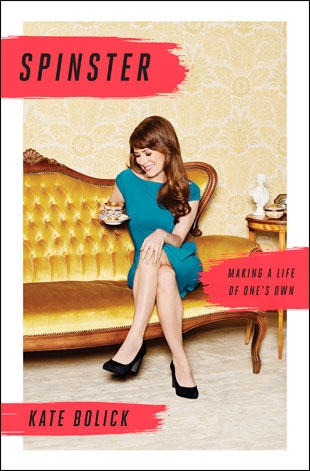"The term spinster follows an inverse trajectory. It originated in fifteenth-century Europe as an honorable way to describe the girls, most of them unmarried, who spun thread for a living — one of very few respectable professions available to women. By the 1600s the term had expanded to include any unmarried woman, whether or not she spun.
"Not until colonial America did spinster become synonymous with the British old maid, a disparagement that cruelly invokes maiden (a fertile virgin girl) to signify that this matured version has never outgrown her virginal state, and is so far past her prime that she never will. At a time when procreation was necessary to building a new population, the biblical imperative to 'be fruitful and multiply' felt particularly urgent, and because only wives, of course, were allowed to have sex, the settlers considered solitary women sinful, a menace to society. If a woman wasn't married by twenty-three she became a 'spinster.' If she was still unwed at twenty-six, she was written off as a hopeless 'thornback,' a species of flat, spiny fish — a discouraging start to America's long evolution in getting comfortable with the idea of autonomous women. During the Salem Witch Trials of 1692, of the nearly two hundred people accused of witchcraft — all of them from the little farming villages and seaside towns I grew up among — the majority were adult women at the fringes of society, whether poor single mothers or widows whose wealth inspired jealousy.
"Indeed, I was raised in spinster territory. Throughout the nineteenth century, New England harbored more single women than anywhere else in the country, with the highest proportion in Massachusetts, which had more than double that of the American population as a whole. This was largely because of the massive losses sustained by the Civil War, which of course ravaged the whole country; historically, wars create a radical spike in the single female population. (In ancient Rome, repeated military campaigns so drastically depleted the pool of marriageable freemen that some single women tried to marry slaves, to much public resistance.) But other factors — the bruised postwar economy, which made it difficult for men to professionalize and marry early; a regional commitment to intellectual and literary pursuits, which extended to women — created a social atmosphere in which single women were allowed, a little bit, to flourish.
"Few people, if any, seriously use the term spinster today, and yet we all agree on what she is. Oxford English Dictionary: 'An unmarried woman, especially an older woman thought unlikely to marry'; American Heritage Dictionary: 'Often offensive. A woman, especially an older one, who has not married'; the dictionary on my MacBook Air: 'An unmarried woman, typically an older woman beyond the usual age for marriage. Usage note: In modern everyday English, "spinster" cannot be used to mean simply "unmarried woman"; it is now always a derogatory term, referring or alluding to a stereotype of an older woman who is unmarried, childless, prissy, and repressed.' Only Black's Law Dictionary offers a neutral definition: 'The addition given in legal proceedings and in conveyancing to a woman who has never been married.' "
